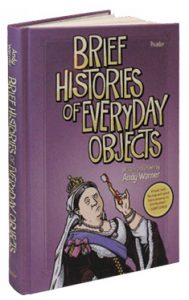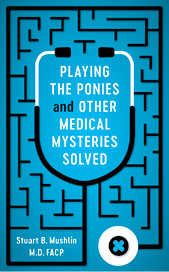 |
Cartoonist Warner conceived the idea for his illustrated hardcover while taking a shower—when it struck him that mundane items, like a showerhead, may have intriguing origins. “I kept digging,” says Warner, whose work has been published by Slate, American Public Media, and BuzzFeed, among others. “All around me, from bags to ballpoint pens, I found stories.” Unfolding in the form of comic strips and organized around common locales—including the bedroom, kitchen, grocery store, and office—the book features tongue-in-cheek historical tales about commonplace, sometimes overlooked objects. There’s an early toothbrush that had a bone for a handle and animal hair as bristles; a dog walk that resulted in the invention of Velcro; the art of paper-making, kept secret in China for six centuries; the first vacuum cleaner, which was mounted in a horse-drawn carriage (nicknamed “Puffing Billy”); and the first American woman to win a patent suit—over a machine that folded paper bags. “Warner is a deft cartoonist,” says Publisher’s Weekly, “able to convey a lot of information, humor, and emotion within a single panel.”
|
 |
In his forty years as a diagnostician, Mushlin has seen his fair share of bizarre medical mysteries. Some patients present straightforward symptoms that turn out to presage rare and serious conditions—such as the man who came in for chronic knee arthritis treatment and was diagnosed with leprosy. Others complain of a wide variety of ailments that require extensive investigation, like the woman with a mental disorder that spurred her to fabricate pain in order to receive medical care and prescription drugs. Throughout his book, in which he details these cases and more, Mushlin emphasizes the value of traditional diagnostic techniques such as carefully observing, physically examining, and listening to patients, rather than relying solely on technology.
|
 |
A professor at Harvard Business School offers nineteen case studies that illustrate some of the most polarizing political conflicts in American history. Moss details the opposing sides of each debate—which range from crafting the Constitution to regulating radio broadcasts, determining voting rights to controlling meat safety inspections—and examines how each conflict impacted the nation’s democratic system, for good or ill. “It’s hard to imagine a timelier book, given America’s tumultuous 2016 elections, than this eminently readable survey of political disputes,” says Publisher’s Weekly.
|
 |
Subtitled “How three ordinary guys disrupted an industry, made billions . . . and created plenty of controversy,” the book explores the largest provider of accommodations worldwide: in less than a decade, Airbnb has attained a higher valuation than Hilton. Gallagher, an assistant managing editor at Fortune, discusses the implications of the company’s rapid ascent, including its effects on the traditional hotel industry and the unintended consequences of people opening their private homes to guests, from damaged property to irate neighbors. “The breadth and whimsy of the options offered makes scrolling through Airbnb’s listings an exercise in escapism,” Gallagher writes of the housing selections—which can range, in the same city, from a $25-per-night room with a twin bed and shared bathroom to a $4,000-a-night five-story townhouse with a view.
|






